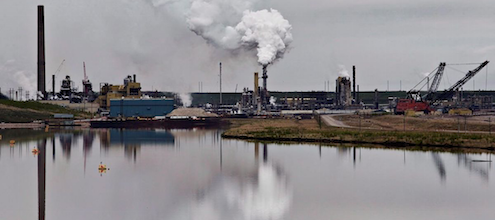
When we debate carbon pricing, can we at least stick to the facts?

As a group of economists, we still believe that facts should matter when it comes to making important policy decisions. Unfortunately, not everyone involved in the Canadian climate policy debate appears to agree. Myths and rhetoric are pushing the real facts to the sidelines. The result is a mix of confusion and polarization that is poisoning our public debate, and we are losing patience.
As a case in point, Ontario Premier Doug Ford recently claimed that carbon pricing will be a “total economic disaster” for the country and cause a “carbon-tax recession.” Despite the fact that this claim strongly contradicts almost all of the available empirical evidence on carbon pricing, we’re hearing it repeated more often.
So, let’s start with this fact: Economists are virtually unanimous in the view that carbon pricing reduces greenhouse-gas emissions at the lowest possible cost to the economy. Other policy approaches – such as intrusive and prescriptive regulations, or generous production or consumption subsidies – will cost the economy far more to achieve the same outcome.
In fact, carbon pricing appears to have negligible impacts on economic growth when it is well-designed. British Columbia has had carbon pricing since 2008, and its economy is one of the strongest in Canada. Quebec has had carbon pricing since 2013, and it is now experiencing an economic renaissance. Carbon pricing isn’t causing the growth in either case, but neither is it preventing it. No “economic disaster” in these provinces. Ditto for California, the United Kingdom and, for that matter, Ontario’s carbon-pricing system that lasted from 2015 until its repeal last year.
Yet Ontario’s leader doubled down on the claim after the contrary evidence was presented. Mr. Ford pushed back on Twitter, questioning the credibility of economists, experts, and evidence. The only evidence his government cited, meanwhile, was a report from the Conference Board of Canada – but its authors immediately weighed in to clarify that their analysis did not support the premier’s claim.
Here’s another carbon-pricing fact: Under the federal policy that begins this spring, roughly 80 per cent of households will receive rebates that actually exceed the amount they will pay in the carbon tax. But because these rebates are entirely independent of the tax itself, they don’t undermine the households’ incentives to reduce emissions. You can collect the rebate and avoid paying the carbon tax by taking actions to reduce emissions, in which case you will be ahead of the game. But if you choose not to do anything different, you’ll lose nothing in terms of your income or purchasing power.
So the federal carbon tax won’t be the tax grab its opponents claim. Yet this fact hasn’t stopped various commentators and politicians from misrepresenting academic research and vastly overstating the costs for average Canadians. Everyone listening to this debate should keep an important idea in mind. A well-designed carbon tax isn’t about raising revenue: it’s about altering prices to drive behavioural change in a way that reduces emissions. It’s not about bigger government; it’s about smarter government.
Here’s a third important fact about carbon pricing: When designed well, carbon pricing protects the competitiveness of Canadian businesses. The carbon-pricing systems in Canada – including Alberta’s policy, the planned federal backstop and Quebec’s cap-and-trade system – were explicitly designed to protect business competitiveness by reducing costs for large emitters. These policies still create financial incentives to reduce greenhouse gas emissions – but by improving performance rather than reducing activity or shifting it to other jurisdictions.
Yet the federal Conservative leader continues to frame this approach as an unfair exemption for businesses. Andrew Scheer is right to object to any exemptions, both for economic and political reasons. But he is wrong that protecting business competitiveness is akin to an exemption. Companies still have a powerful economic incentive to reduce emissions because their costs will fall by doing so. That’s the essence of a carbon price.
These three facts about carbon pricing are not disputed by the people who have seriously examined how these policies work, whether in Canada or elsewhere. Yet political opportunists continue pushing the myths and rhetoric, while disregarding the actual evidence. This is no way to have a serious policy debate.
Canadians need a real debate about climate policy. Those who oppose carbon pricing should either admit that they don’t care about climate change or they should propose a serious alternative policy. Maybe it’s the use of prescriptive regulations; maybe it’s the use of subsidies to low-carbon technologies; maybe it’s something else altogether. Whatever the choice, we need to debate the options based on actual evidence and solid analysis.
Let’s start hearing from those opponents about their alternative policies, and why they promise lower costs and more effectiveness at reducing greenhouse gas emissions. We doubt their options will actually be better than carbon pricing, but we’re certainly open to the discussion.
Either way, it’s long overdue that we stop the myths and the fear-mongering. Canadians deserve the truth when it comes to debating something as important as climate policy.
This article originally appeared in the Globe and Mail on February 6th, 2019.




1 comment
I don’t know if you got the Econ Research Network thing on carbon pricing, the one with the letter signed by many nobel laureates, and with a place where anyone with credentials as an economist could sign. The letter was originally published in the Wall Street Journal. If you have any influence, you might try to get the Globe and Mail to publish it. Oh, your piece in the Globe is right on the money. What’s interesting is that carbon pricing SHOULD be the favoured policy of conservatives of any stripe. So what’s going on is totally dishonesty to suck up for votes. Anyway, thanks for the Globe piece.
Comments are closed.